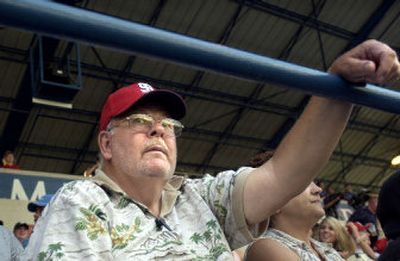An angel for the Indians

Spokane Indians manager Gregg Riddoch calls George Moore a guardian angel.
Indians trainer Eddie Tamez calls him another grandfather or father figure. The players who have stayed with him simply call him Papa George.
George Moore, 73, became a host parent for Spokane players six years ago at the suggestion of his daughter, shortly after his wife, Carole Jean, died of cancer.
A retired steel worker of 41 years at Kaiser Aluminum who lives in Spokane Valley, Moore says taking in Indians players and coaches has saved his life.
“Those kids keep me going. They keep me from curling up and dying,” he said. “When you get older and feel that you are not useful, there are a lot of tendencies to curl up and die.”
When Alex Guerra was cut by the Texas Rangers last year, Moore drove the reserve infielder to the airport. It was a difficult drive because the two had bonded quickly.
When he came back home, he found a letter by Guerra.
“You’ve been my father,” wrote Guerra on July 4 at 2:30 a.m. “And I don’t want to lose you. … Don’t forget your son, Alex Guerra, the Venezuelan guy, his wife, Neyli, because until the last day of my life, you’re going to be present in my mind.”
While he will take in any player, the ones from Latin America have a special place in his heart.
“They have more obstacles and they put forth more effort,” said Moore. “They also bring a lot of love.”
Every time a player leaves, it just gets harder and harder.
“It tears at your heart,” said Moore of the players from Latin America. “They are beautiful kids. The United States would be a lot better if it had kids like this. They are very appreciative of what they get.”
Moore’s kind-hearted nature goes back to his grandfather on his mother’s side of the family, who after joining up with Gen. George Custer was sickened by the atrocities that were occurring, according to Moore.
“He was a big Indian sympathizer and was never proud that he fought in the Indian wars,” said Moore. “They would kill women and children.”
Moore remembers being on his grandfather’s farm and witnessing his kindness. Out of the eight acres, two were set aside for visitors.
At Moore’s home, two rooms and a trailer are set aside for visitors.
The first year, he hosted two coaches. The next year he got two coaches, who stayed in the trailer, and two players.
One of the coaches, pitching coach Craig Bjornson, brought in the players, introduced them to Moore and then went to his trailer. The two players, who were Latin American, and Moore just stared at each other for a while. Then Moore, a hunting enthusiast, decided to show off his hunting rifle. The players, who had not even dropped their bags, ran outside the house in fear.
“That first time, it was comical,” said Moore. “They went out to the street corner. They thought I was going to shoot them or something. I never did that again.”
The next night the players tried to stay in the clubhouse at the stadium, but the coach brought them back.
Earlier this year Moore cried with infielder Julio Santana when Santana’s grandmother, Clemencia Café, died. After being told of her death, Santana was inconsolable as Moore approached him.
Later that night, “he came to me and he said, ‘Papa, we are poor,’” said Moore. Santana asked Moore if he could lend him $100 for funeral expenses. Moore didn’t lend him the money; he gave it to him.
“I can laugh with them, I can joke with them and I can cry with them,” said Moore. “And I’ve done it all with this group.”
This year’s group includes four Dominican players – catcher Lizahio Báez, pitchers Juan Carlos García and Juan Maldonado, and Santana. He also has one American player, Cain Byrd, and two trainers – Tamez and strength and conditioning coach Rich Widener. One of his sons also lives with him. Including Moore, nine people live in the house and trailer.
Moore helps the players with their shopping needs, taking them to the Wal-Mart in Spokane Valley or the Albertsons on Trent Avenue. He has a freezer full of rice, meats and salsa in the downstairs room where Báez, García and Byrd are staying. Most of the time he lets the players cook their own food and watch their own channels on television.
Moore himself has developed a taste for some of the Dominican dishes like plantain and carne guisada con arroz (beef stew with rice).
“One guy cooks, and the others watch their soap operas on the Spanish channels,” said Moore of this year’s group. “They jumped out when they found the Spanish channels. These guys turn on the TV and watch their Spanish soap operas (Telenovelas) on Univision.”
On game days, when the players sit down to eat in the kitchen, during what Moore calls the busiest time of the day, they sit underneath two signs above the kitchen tables. One reads, “Carole’s Kitchen.” The other says, “This home is built with love.”
The players, said Moore, “bring a lot of love since my wife died. They fill a void. They keep me going. They make me feel like a human being.”